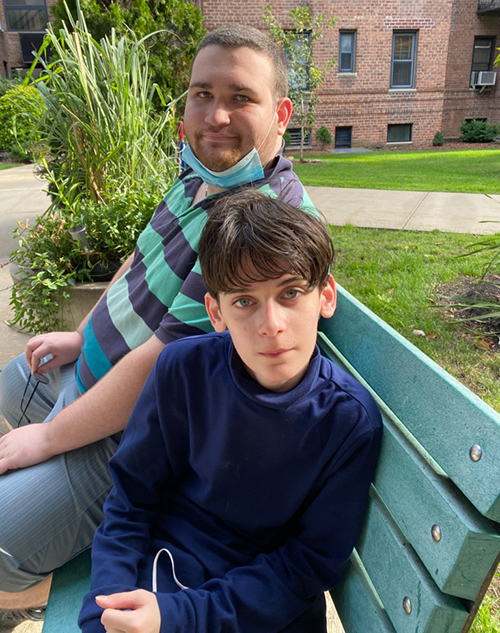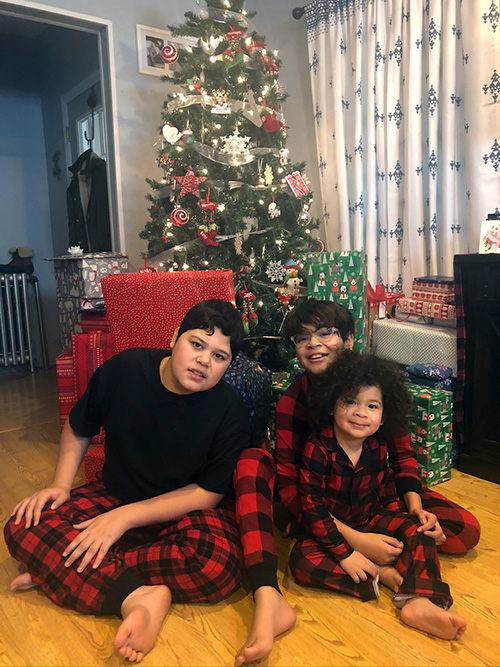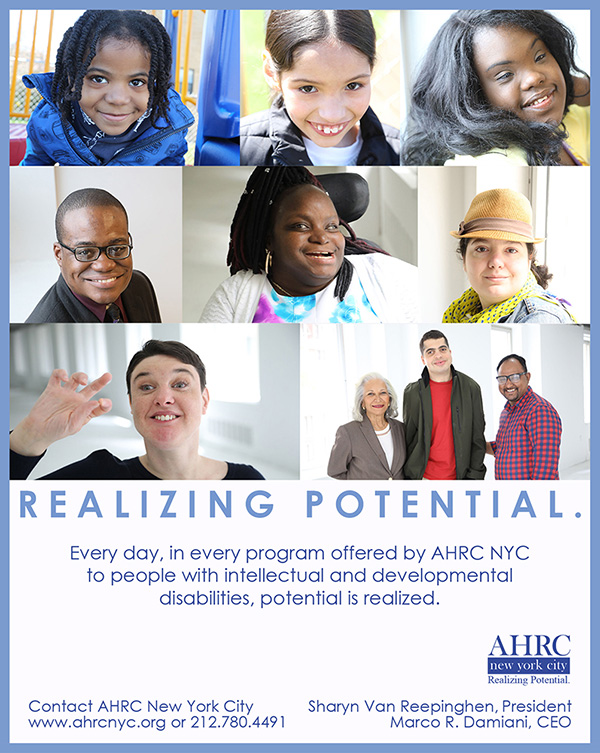Lori Jacobs recalled a conversation with her younger son Seth, whose brother Ian has high-functioning autism and mood disorders. “Seth said, ‘Promise me I won’t have to take care of him when I grow up. And please, promise me you have a plan for him,’” Lori said.
This wasn’t the type of conversation she imagined having with then 13-year-old Seth. “He worries about his brother,” she added. “He loves, adores and respects Ian.”

Seth Jacobs, 14, and his brother Ian, 20, who has high functioning autism.
Seth has been a member of AHRC New York City’s Sibshop since he was 5.
Growing Up Quickly
Seth, now 14, is a member of AHRC New York City’s Sibshops, a therapeutic recreation workshop for siblings of a brother or sister with autism or other developmental disabilities. He joined at age 5. Annette Spallino, Coordinator for AHRC New York City’s Sibshops and Social Work Supervisor with the agency’s Family and Clinic Services, has seen siblings grow up quickly. While neurotypical siblings’ experiences vary widely, this is one of many challenges they share.
“Some (like Seth) are scared that they may have to take care of their sibling,” Spallino said. “I tell them that this is not something they have to be concerned about now. ‘What you have to do now is be a kid. What you have control over is what you can do now.’”
Like many of the 5- to 14-year-olds in Sibshops, Seth is extremely mature, bright, and articulate. “He’s a young boy beyond his years,” Spallino added.
Early Adopter of Sibling Programs
AHRC NYC began one of the first sibling programs in the country in the 1980’s. In the late 80’s and 1990’s, AHRC NYC sponsored several sibling conferences where siblings from the tri-state area gathered to talk about what it was like to grow up with a sister or brother with developmental disabilities and the shared issues they faced. Today, AHRC NYC continues to run sibling programming in the form of Sibshops for younger siblings. Several siblings are also members of the AHRC NYC Board of Directors where they advocate for people with disabilities and share their perspective with the Board.
The sibling relationship is likely to last longer than any other. Siblings welcome professional and peer support in Sibshops’ non-judgmental environment.
Support for All Family Members
“Families need comprehensive early intervention that includes support for sibling interactions,”1 says Helen Tager-Flusberg, a Boston University autism researcher on language development. “Siblings with and without ASD need strategies to relate to each other – to help themselves and the functioning of the family as a whole.”
Parents are more willing to discuss what’s going on in their lives, Spallino said. “They want to see themselves as a family unit, not as damaged goods. There’s a lot more support for the individual with autism and the family thanks to advocacy which is really helpful to parents,” she added.
Veronica Sterling, a Bronx mother of two sons with autism and a neurotypical daughter, agrees. “We need support and our kids need support.”

Jocelyn Sterling, 10, with her brothers Noah, 14, and Jayce, 3,
both of whom are on the autism spectrum.
“Not understanding your sibling is a problem,” Jocelyn says.
Not Alone
“Our Sibshops help them to understand and not feel alone,” Spallino said. “The kids often feel they’re the only ones with this problem – they’re very ‘me’ focused. It’s eye-opening for them to see 15 other kids in the same boat. And they know you can say whatever you want here.”
Jocelyn Sterling, 10, joined AHRC NYC’s Sibshops at age 6. “It’s not easy to have a sibling with autism,” she said. “You have to understand they’re different from you.” Her brothers, Noah, 14, and Jayce, 3, are on the spectrum.
“I was really nervous about going,” she said. “I thought there was only one special need (autism), but I learned there are different special needs. I feel more comfortable talking about my brothers with others because my friends don’t understand autism.”
Understanding Your Sibling
One of the top challenges facing siblings spans the youngest and teen Sibshop members. “Understanding why my sibling does what he or she does is difficult,” Spallino said. “What is really wrong with him/her and why is it always 24/7 the United State of Johnny or Jane?”
This logically leads to feelings of jealousy. Sibshop members don’t understand why their parents pay so much attention to their sibling with autism. They see a double standard cause the sibling gets more attention when he/she has a behavior problem and requires special services, yet if they misbehave, they may be punished.
Sharing a Strong Bond
Despite this, strong bonds evolve. A Tel Aviv University and University of Haifa study found that relationships between children and their siblings with intellectual disabilities are more positive than those between typically developing siblings.2 The research examines the relationships of typically developing children with siblings with and without intellectual disabilities through artwork and questionnaires. It was conducted by Prof. Anta Zaidman-Zait of the Department of School Counseling and Special Education at TAU’s Constantiner School of Education and Dr. Dafna Regev and Miri Yechezkiely of the University of Haifa’s Graduate School of Creative Art Therapies. The study was recently published in Research in Developmental Disabilities.
Virtual Sibshops to Start in Fall
With the Covid-19 pandemic, AHRC NYC was unable to host Sibshops since the spring. Siblings also missed out on an annual weekend at AHRC NYC’s Camp Anne. “I can only imagine how much worse it can be with everyone at home,” Spallino said, adding that going to school would provide a welcome break for neurotypical siblings. “School helps them to normalize. It’s very hard when these kids are home in a virtual classroom and their sibling is home not cooperating. That can be very distracting.”
Sibshops across the nation are going virtual. AHRC NYC’s Sibshops will begin in September on Saturdays, Spallino said. “We may be able to reach a wider audience by going virtual,” she added. Among the activities planned for AHRC NYC’s Sibshops are:
- asking participants to find a personal item in their home and what makes it so special
- describing your feeling about being home during the pandemic by coloring in this picture of a heart
- finding something in your home that makes you think of your sibling, aka “Zoom Around the Room”
Ian and Seth
In many ways, Seth and Ian Jacobs relationship isn’t that different from other siblings. During a recent weekend away with his father, Seth decided to ping Ian’s phone nonstop, simply to get on his brother’s nerves. After a while his mother called his father to tell him to knock it off.
“When Ian got diagnosed at 16, it was almost a relief,” Lori Jacobs said. “We could put a name on and a reason for things that had been challenging to our family. I told Seth, ‘this is why Ian insists on playing one game with you over and over again or talk only about Star Wars.’”
Seth, who like other younger siblings took on the role of older brother at a young age, already had been aware of Ian’s challenges. Over the years, he has learned to read Ian’s moods. His mother explained that sometimes you can say something to Ian that’s perfectly acceptable, but it was not acceptable to say the same thing a week later.
“When I was younger, I would have no clue what would set him off,” Seth said. “The biggest challenge now is that his mood can change pretty fast.”
The two enjoy playing video games. Seth is particularly proud of the first time he defeated Ian in chess on a giant board at a hotel in the Catskills. And then there was a recent morning when Seth was sleeping and Ian began poking him nonstop. After he stopped, Ian started in again. “Ian’s pretty cool to be around,” Seth said.
“They are each other’s closest friend,” Lori said.
More Support for Siblings
“Sibling support has exploded,” Spallino said. With more community inclusion, society sees individuals with autism and other developmental disabilities in schools, restaurants and anyplace people without disabilities gather. “The world is more open and there are opportunities to identify as a sibling,” Spallino said.
Lynn Uhlfelder Berman does Public/Media Relations for AHRC New York City. For more information about AHRC New York City’s Sibshops or to register, call 212-780-2592 or email annette.spallino@ahrcnyc.org.
Footnotes
- Law, Bridget Murray (2020, April 1). Strengthening Families by Involving Siblings in Autism Treatment, from https://leader.pubs.asha.org/doi/10.1044/leader.FTR1.25042020.48
- American Friends of Tel Aviv University. (2020, Jan. 14) “Siblings of children with intellectual disabilities score high on empathy and closeness” from www.sciencedaily.com/releases/2020/01/200114123525.htm






[…] good piece about the power of Sibshops. Read Siblings Realize They’re Not Alone: AHRC NYC Sibshops Unveil Common Challenges in Autism Spectrum […]